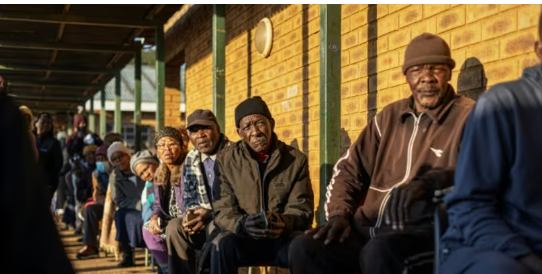South Africa Heads to Watershed Election:-
In a striking development that could reshape South Africa’s political landscape, the African National Congress (ANC) is on track to lose its majority in the upcoming watershed election. This pivotal moment reflects widespread dissatisfaction with the ruling party’s performance and signals a potential shift in the nation’s governance.
A Historical Overview: The ANC’s Legacy
The ANC, once the venerated liberation movement that led South Africa out of the apartheid era, has been the dominant political force in the country since 1994. Under the leadership of Nelson Mandela, the party ushered in a new democratic era, promising equality, development, and prosperity for all South Africans. Over the years, the ANC has enjoyed significant support, consistently winning majorities in national elections.
However, in recent years, the party’s reputation has been tarnished by allegations of corruption, mismanagement, and inefficacy in addressing the country’s pressing issues. The initial optimism and faith that many South Africans placed in the ANC have been eroded by a series of scandals and persistent socio-economic challenges.
The Build-Up to the Watershed Election
As South Africa approaches this crucial election, the political atmosphere is charged with anticipation and uncertainty. Several factors have contributed to the ANC’s declining support, creating a perfect storm that threatens its political dominance.
- Economic Challenges: South Africa’s economy has struggled with slow growth, high unemployment rates, and increasing inequality. The ANC’s inability to effectively address these economic issues has led to widespread discontent. Many South Africans, especially the youth, feel disillusioned by the lack of job opportunities and the growing disparity between rich and poor.
- Corruption Scandals: Over the past decade, the ANC has been embroiled in numerous corruption scandals, with high-profile cases involving senior party members. The infamous Gupta scandal, which implicated former President Jacob Zuma, highlighted the deep-rooted corruption within the party and the state. These revelations have severely damaged the ANC’s credibility and trustworthiness in the eyes of the public.
- Service Delivery Failures: One of the most significant grievances among South Africans is the government’s failure to provide essential services, particularly in areas such as water, electricity, and sanitation. Persistent issues with water supply, rolling blackouts, and inadequate public infrastructure have fueled frustration and anger among citizens.
- Internal Party Divisions: The ANC has also been plagued by internal divisions and factionalism, weakening its cohesion and ability to govern effectively. Power struggles and infighting within the party have distracted from addressing national issues and have further alienated the electorate.
The Emergence of Opposition Parties
As the ANC’s support wanes, opposition parties have capitalized on the growing dissatisfaction to position themselves as viable alternatives. The Democratic Alliance (DA), the Economic Freedom Fighters (EFF), and other smaller parties have been gaining traction, presenting themselves as the solution to the ANC’s perceived failures.
- Democratic Alliance (DA): The DA has traditionally been the main opposition party, advocating for a liberal, market-oriented approach to governance. The party has gained support among middle-class and urban voters who are disillusioned with the ANC’s governance.
- Economic Freedom Fighters (EFF): Founded by former ANC youth leader Julius Malema, the EFF has positioned itself as a radical, left-wing party advocating for land reform, nationalization of key industries, and economic redistribution. The EFF has resonated with many young and disenfranchised voters, particularly in poorer and rural areas.
- Other Parties: Smaller parties, such as the Inkatha Freedom Party (IFP) and the United Democratic Movement (UDM), have also been making inroads, appealing to specific regional and ethnic constituencies.
The Watershed Election: Key Issues and Voter Sentiments
As South Africa heads to the polls, several key issues are likely to dominate the election campaign and influence voter sentiments.
- Corruption and Governance: The demand for clean, accountable governance is a major concern for voters. Many South Africans are tired of the corruption scandals that have plagued the ANC and are looking for parties that promise transparency and integrity.
- Economic Recovery: With unemployment rates soaring, particularly among the youth, economic recovery and job creation are critical issues. Voters are keen to support parties with credible economic plans that can stimulate growth and provide employment opportunities.
- Service Delivery: The failures in basic service delivery, such as water supply and electricity, are top-of-mind for many citizens. Parties that can convincingly address these issues and promise reliable infrastructure are likely to gain support.
- Social Justice: Issues of land reform, social inequality, and racial justice remain potent in South Africa’s socio-political landscape. Parties like the EFF, which focus on radical economic transformation and social justice, continue to attract voters who feel marginalized and disenfranchised.
The ANC’s Response: Attempting a Turnaround
Facing the very real possibility of losing its majority, the ANC has been making concerted efforts to reconnect with its base and address the criticisms leveled against it.  for more information click on this link
for more information click on this link
- Anti-Corruption Measures: President Cyril Ramaphosa has emphasized his commitment to rooting out corruption within the party and the government. Several high-profile figures have been prosecuted, and there are ongoing efforts to recover stolen funds and implement stricter anti-corruption measures.
- Economic Initiatives: The ANC has rolled out various economic initiatives aimed at stimulating growth, such as investment in infrastructure, support for small businesses, and job creation programs. Ramaphosa has also been working to attract foreign investment and rebuild trust in the South African economy.
- Service Delivery Improvements: Recognizing the critical importance of service delivery, the ANC has pledged to improve water supply, electricity, and sanitation services. Efforts are being made to address the infrastructure deficits and enhance the efficiency of public service provision.
- Unity and Cohesion: The ANC leadership has been working to address internal divisions and present a united front. Ramaphosa has called for unity within the party, emphasizing the need to focus on governance and delivering on electoral promises.
The Voter’s Voice: A Call for Change
As election day approaches, South Africans from all walks of life are reflecting on the state of their nation and the direction they want it to take. The sentiment on the ground indicates a strong desire for change and a break from the status quo.
- Young Voters: The youth, who make up a significant portion of the electorate, are particularly vocal about their frustrations. High unemployment rates, lack of opportunities, and disillusionment with political leadership have driven many young South Africans to seek alternatives to the ANC.
- Urban Middle Class: In urban areas, the middle class is increasingly disenchanted with the ANC’s governance. Issues such as corruption, economic stagnation, and service delivery failures resonate strongly with this demographic, leading many to consider other parties like the DA.
- Rural Communities: In rural areas, where poverty and lack of services are more pronounced, the EFF’s message of radical economic transformation has found a receptive audience. Many rural voters are drawn to the promise of land reform and greater economic equality.
- Civil Society and Activists: Civil society organizations and activists have been playing a crucial role in mobilizing voters and advocating for accountability and good governance. These groups are working to ensure that the electorate is informed and engaged, and that the election process is transparent and fair.
 for more information click on this link
for more information click on this link
Looking Ahead: The Future of South Africa’s Democracy
The upcoming election represents a critical juncture for South Africa’s democracy. The potential loss of the ANC’s majority could usher in a new era of coalition politics and greater political pluralism. This shift could foster a more competitive and dynamic political environment, where accountability and responsiveness to the electorate are paramount.
- Coalition Politics: Should the ANC lose its majority, coalition governments could become the norm. This scenario would require political parties to collaborate and negotiate, potentially leading to more balanced and inclusive governance.
- Strengthening Democracy: A more competitive political landscape could strengthen South Africa’s democracy, as parties are compelled to be more responsive to voters’ needs and concerns. This could lead to greater transparency, reduced corruption, and improved service delivery.
- Economic and Social Reforms: The pressure to deliver on electoral promises and address pressing issues could drive substantive economic and social reforms. Parties will need to present and implement credible policies to tackle unemployment, inequality, and service delivery challenges.
- Public Engagement: The election has sparked a renewed interest in politics and public engagement among South Africans. This heightened political awareness and activism can lead to a more informed and active citizenry, which is essential for a healthy democracy.
Conclusion: A Moment of Transformation
As South Africa stands on the brink of a potentially transformative election, the nation reflects on its journey and the path forward. The ANC’s anticipated loss of its majority signals a significant shift in the political landscape, driven by widespread dissatisfaction with corruption, economic challenges, and service delivery failures.
For many South Africans, this election represents an opportunity for change and a chance to hold their leaders accountable. The emergence of opposition parties and the prospect of coalition politics suggest a more competitive and dynamic future, where political power is more evenly distributed and responsive to the electorate.
The road ahead is uncertain, but the desire for a better, more just, and prosperous South Africa is clear. As voters head to the polls, their voices will shape the future of the nation and determine the course of its democracy. In this watershed moment, the hope for renewal and progress shines brightly, illuminating the path towards a more inclusive and equitable society, ALSO READ:- Russian Military Tensions Escalate as Kyiv Reports Destruction of Two Russian Military Boats in Crimea 2024




